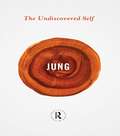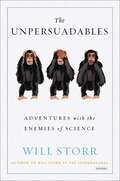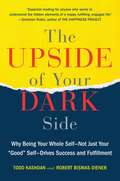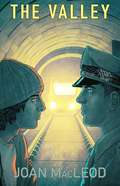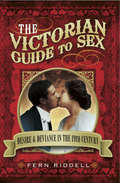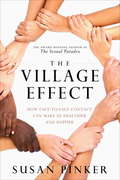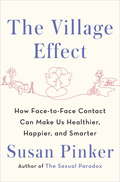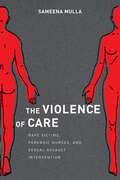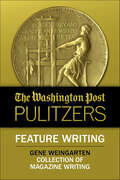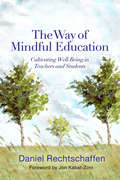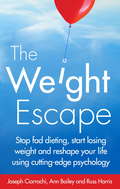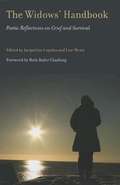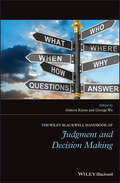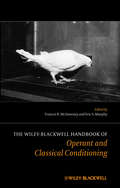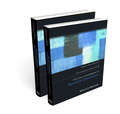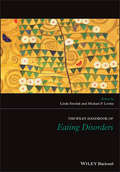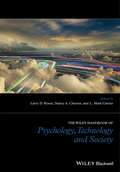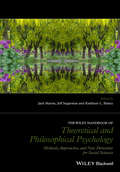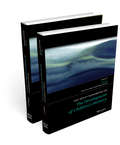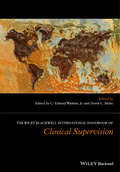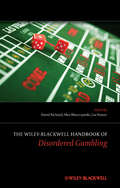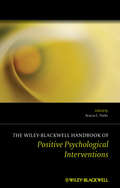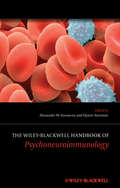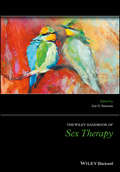- Table View
- List View
The Undiscovered Self (Routledge Great Minds)
by Carl Gustav JungWritten three years before his death, The Undiscovered Self combines acuity with concision in masterly fashion and is Jung at his very best. Offering clear and crisp insights into some of his major theories, such as the duality of human nature, the unconscious, human instinct and spirituality, Jung warns against the threats of totalitarianism and political and social propaganda to the free-thinking individual. As timely now as when it was first written, Jung's vision is a salutary reminder of why we should not become passive members of the herd. With a new foreword by Sonu Shamdasani.
The Unpersuadables: Adventures with the Enemies of Science
by Will Storr“A tour de force . . . [Storr’s] dogged approach to nailing many of the most celebrated skeptics in lies and misrepresentations is welcome.” —SalonWhy, that is, did the obviously intelligent man beside him sincerely believe in Adam and Eve, the Garden of Eden and a six-thousand-year-old Earth, in spite of the evidence against them? It was the start of a journey that would lead Storr all over the world—from Texas to Warsaw to the Outer Hebrides—meeting an extraordinary cast of modern heretics whom he tries his best to understand. Storr tours Holocaust sites with famed denier David Irving and a band of neo-Nazis, experiences his own murder during “past life regression” hypnosis, discusses the looming One World Government with an iconic climate skeptic, and investigates the tragic life and death of a woman who believed her parents were high priests in a baby-eating cult. Using a unique mix of highly personal memoir, investigative journalism, and the latest research from neuroscience and experimental psychology, Storr reveals how the stories we tell ourselves about the world invisibly shape our beliefs, and how the neurological “hero maker” inside us all can so easily lead to self-deception, toxic partisanship and science denial.“The subtle brilliance of The Unpersuadables is Mr. Storr’s style of letting his subjects hang themselves with their own words.” —The Wall Street Journal“Throws new and salutary light on all our conceits and beliefs. Very valuable, and a great read to boot, this is investigative journalism of the highest order.” —The Independent, Book of the Week
The Upside of Your Dark Side: Why Being Your Whole Self--Not Just Your "Good" Self--Drives Success and Fulfillment
by Todd Kashdan Robert Biswas-DienerTwo mavericks in the field of positive psychology deliver a timely message Happiness experts have long told us to tune out our negative emotions and focus instead on mindfulness, positivity, and optimism. Researchers Todd Kashdan, Ph.D., and Robert Biswas-Diener, Dr. Philos., disagree. Positive emotions alone are not enough. <P><P> Anger makes us creative, selfishness makes us brave, and guilt is a powerful motivator. The real key to success lies in emotional agility. Drawing upon extensive scientific research and a wide array of real-life examples, The Upside of Your Dark Side will be embraced by business leaders, parents, and everyone else who's ready to put their entire psychological tool kit to work. and a wide array of real-life examples including sports, the military, parenting, education, romance, business, and more, The Upside of Your Dark Side is a refreshing reality check that shows us how we can truly maximize our potential. <P>With an appreciation of our entire psychological toolkit, we become whole--which allows us to climb the highest peaks and handle the deepest valleys.
The Valley
by Joan Macleod"MacLeod has a wonderful ear and eye for the everyday details."--Calgary HeraldInspired by the 2007 Tasering death of Robert Dziekanski at the Vancouver airport, The Valley dramatizes the volatile relationship between law enforcement and people in the grip of mental illness. The play connects both sides of this relationship by portraying two families embattled with depression, each guided by good intentions but challenged by their own flawed humanity.Joan MacLeod is the author of numerous award-winning plays. Her work has been translated into more than eight languages with productions throughout the world, including a sold-out run in New York.
The Victorian Guide to Sex: Desire & Deviance in the 19th Century
by Fern Riddell“An enjoyable read and an informative survey of Victorian sexual tastes and preoccupations . . . a rigorously balanced account of this complex subject.” —Victorian SecretsAn exciting factual romp through sexual desire, practices and deviance in the Victorian era. The Victorian Guide to Sex will reveal advice and ideas on sexuality from the late 19th century. Drawing on both satirical and real-life events from the period, it explores every facet of sexuality that the Victorians encountered.Reproducing original advertisements and letters, with extracts taken from memoirs, legal cases, newspaper advice columns, and collections held in the Museum of London and the British Museum, this book reveals historical sexual proclivities.“Riddell’s book lifts the veil on historic sexual attitudes to illuminate the secrets of our ancestors’ lives. Written with wry humour in a pastiche of Victorian style, the book is both entertaining and highly informative.” —Your Family Tree
The Village Effect
by Susan PinkerIn her surprising, entertaining and persuasive new book, award-winning author and psychologist Susan Pinker shows how face-to-face contact is crucial for learning, happiness, resilience and longevity. From birth to death, human beings are hard-wired to connect to other human beings. Face to face contact matters: tight bonds of friendship and love heal us, help children learn, extend our lives and make us happy. Looser in-person bonds matter, too, combining with our close relationships to form a personal "village" around us, one that exerts unique effects. And not just any social networks will do: we need the real, face-to-face, in-the-flesh encounters that tie human families, groups of friends and communities together. Marrying the findings of the new field of social neuroscience together with gripping human stories, Susan Pinker explores the impact of face-to-face contact from cradle to grave, from city to Sardinian mountain village, from classroom to workplace, from love to marriage to divorce. Her results are enlightening and enlivening, and they challenge our assumptions. Most of us have left the literal village behind, and don't want to give up our new technologies to go back there. But, as Pinker writes so compellingly, we need close social bonds and uninterrupted face-time with our friends and families in order to thrive--even to survive. Creating our own "village effect" can make us happier. It can also save our lives.From the Hardcover edition.
The Village Effect
by Susan PinkerIn her surprising, entertaining, and persuasive new book, award-winning author and psychologist Susan Pinker shows how face-to-face contact is crucial for learning, happiness, resilience, and longevity. From birth to death, human beings are hardwired to connect to other human beings. Face-to-face contact matters: tight bonds of friendship and love heal us, help children learn, extend our lives, and make us happy. Looser in-person bonds matter, too, combining with our close relationships to form a personal "village" around us, one that exerts unique effects. Not just any social networks will do: we need the real, in-the-flesh encounters that tie human families, groups of friends, and communities together. Marrying the findings of the new field of social neuroscience with gripping human stories, Susan Pinker explores the impact of face-to-face contact from cradle to grave, from city to Sardinian mountain village, from classroom to workplace, from love to marriage to divorce. Her results are enlightening and enlivening, and they challenge many of our assumptions. Most of us have left the literal village behind and don't want to give up our new technologies to go back there. But, as Pinker writes so compellingly, we need close social bonds and uninterrupted face-time with our friends and families in order to thrive--even to survive. Creating our own "village effect" makes us happier. It can also save our lives.Advance praise for The Village Effect "A terrific book . . . Pinker makes a hardheaded case for a softhearted virtue. Read this book. Then talk about it--in person!--with a friend."--Daniel H. Pink, New York Times bestselling author of Drive and To Sell Is Human "What do Sardinian men, Trader Joe's employees, and nuns have in common? Real social networks--though not the kind you'll find on Facebook or Twitter. Susan Pinker's delightful book shows why face-to-face interaction at home, school, and work makes us healthier, smarter, and more successful."--Charles Duhigg, New York Times bestselling author of The Power of Habit: Why We Do What We Do in Life and Business "Provocative and engaging . . . Pinker is a great storyteller and a thoughtful scholar. This is an important book, one that will shape how we think about the increasingly virtual world we all live in."--Paul Bloom, author of Just Babies: The Origins of Good and Evil "A fascinating, nuanced study of that most fundamental need: the need for human connection."--Maria Konnikova, New York Times bestselling author of Mastermind: How to Think Like Sherlock Holmes "The Village Effect is a fascinating explanation of why we need regular contact with people, not just screens--and why time spent with your neighbors will enrich and extend your life in ways you never imagined."--John Tierney, New York Times bestselling co-author of Willpower: Rediscovering the Greatest Human Strength "With a raft of surprising data, this compulsively readable, lively and meticulously researched book shows that direct and frequent human contact is at least as important to our survival as clean air or good nutrition."--Christina Hoff Sommers, author of Freedom Feminism: Its Surprising History and Why It Matters TodayFrom the Hardcover edition.
The Violence of Care: Rape Victims, Forensic Nurses, and Sexual Assault Intervention
by Sameena MullaWinner, 2017 Margaret Mead Award presented by the American Anthropological Association and the Society for Applied AnthropologyHonorable Mention, 2015 Eileen Basker Memorial Prize presented by the Society for Medical Anthropology Analyzes the ways in which nurses work to collect and preserve evidence while addressing the needs of sexual assault victims as patientsEvery year in the US, thousands of women and hundreds of men participate in sexual assault forensic examinations. Drawing on four years of participatory research in a Baltimore emergency room, Sameena Mulla reveals the realities of sexual assault response in the forensic age. Taking an approach developed at the intersection of medical and legal anthropology, she analyzes the ways in which nurses work to collect and preserve evidence while addressing the needs of sexual assault victims as patients.Mulla argues that blending the work of care and forensic investigation into a single intervention shapes how victims of violence understand their own suffering, recovery, and access to justice—in short, what it means to be a “victim”. As nurses race the clock to preserve biological evidence, institutional practices, technologies, and even state requirements for documentation undermine the way in which they are able to offer psychological and physical care. Yet most of the evidence they collect never reaches the courtroom and does little to increase the number of guilty verdicts. Mulla illustrates the violence of care with painstaking detail, illuminating why victims continue to experience what many call “secondary rape” during forensic intervention, even as forensic nursing is increasingly professionalized. Revictimization can occur even at the hands of conscientious nurses, simply because they are governed by institutional requirements that shape their practices.The Violence of Care challenges the uncritical adoption of forensic practice in sexual assault intervention and post-rape care, showing how forensic intervention profoundly impacts the experiences of violence, justice, healing and recovery for victims of rape and sexual assault.
The Washington Post Pulitzers: Feature Writing, Gene Weingarten
by Gene WeingartenRecipient of the Pulitzer Prize for Feature Writing. What happens when one of the world&’s most renowned musicians appears incognito outside of a Washington, D.C. metro station to play some of the most beautiful music ever composed? In the audacious social experiment, &“Pearls Before Breakfast&”, Gene Weingarten seeks out the answer to this question as he chronicles how an audience of rush hour pedestrians pass indifferently by as international wunderkind Joshua Bell plays his Stradivarius. He also examines a horrifying phenomenon in the remarkable story "Fatal Distraction", in which he speaks to thirteen mothers and fathers whose children died as the result of being left in a sweltering car during the hot summer months. The result is an emotional revelation that inspires readers to take a closer look at the world around them.
The Way of Mindful Education: Cultivating Well-Being in Teachers and Students
by Jon Kabat-Zinn Daniel RechtschaffenA new educational paradigm for youth mindfulness. "If you are a teacher, or an educator, or involved in school administration and curriculum development, the book you hold in your hands has the potential to transform your life, the lives of your students, and the life of the school itself, as well as education in America."--Jon Kabat-Zinn, PhD, from the Foreword With attention spans waning and stress on the rise, many teachers are looking for new ways to help students concentrate, learn, and thrive. The Way of Mindful Education is a practical guide for cultivating attention, compassion, and well-being not only in these students, but also in teachers themselves. Packed with lesson plans, exercises, and considerations for specific age groups and students with special needs, this working manual demonstrates the real world application of mindfulness practices in K-12 classrooms. Part I, Why Mindful Education Matters, explains what mindfulness is, the science behind its benefits for students and educators, and the inspiring work that is already underway in the Mindful Education movement. In Part II, Begin with Yourself, we are reminded that in order to teach mindfully, we need to be mindful. Here teachers will learn the when, where, and how of mindfulness so they can effectively embody its practices with their students. Mindfulness practices offer teachers self-care and attention skills that prepare them to teach with greater energy and mastery. Discover how simple exercises can help manage stress, focus attention, develop compassion, and savor positive experiences in everyday life. Part III, Cultivating a Mindful Classroom, explores the qualities of a mindful teacher, the ingredients of a mindful learning environment, and helpful skills for appropriate, supportive work with cultural diversity, student stress and trauma, and varying age groups and developmental stages. Finally, in Part IV, Mindful Education Curriculum, we learn eighteen ready-to-use mindfulness lessons for use in schools. These practical exercises, designed to foster skills like embodiment, attention, heartfulness, and interconnectedness, can be readily adapted for any age group and population, and the author draws from his extensive personal experience to offer a wealth of tips for introducing them to students in real-time. Decades of research indicate the impressive benefits of mindfulness in social, emotional, and cognitive development, and as an antidote to emotional dysregulation, attention deficits, and social difficulties. This book invites teachers, administrators, and anyone else involved in education to take advantage of this vital tool and become purveyors of a mindful, compassionate, ethical, and effective way of teaching.
The Weight Escape: Stop fad dieting, start losing weight and reshape your life using cutting-edge psychology
by Russ Harris Ann Bailey Joseph CiarrochiToday's the day to start making real changes. Diet fads and fitness trends may offer the prospect of losing weight, but they rarely work out long-term. The Weight Escape is different. Using the psychological science of ACT - Acceptance and Commitment Therapy - Dr Russ Harris, medical doctor and author of The Happiness Trap, psychological practitioner Ann Bailey and scientist Joseph Ciarrochi will help you make the lasting changes you want. Focusing on the mental barriers that can stop us setting and achieving our goals, it promotes a holistic approach to wellbeing and weight loss - one that goes beyond meal plans and calorie counting to give a deeper meaning and mindfulness to how you live and what you eat. Through practical exercises, quizzes and personal stories, it shows you how to: · Set goals and give direction to your life · Overcome destructive habits and exercise self-control · Deal with cravings and stressful situations · Develop self-acceptance. Get the weight-loss results you want - and so much more.
The Widows' Handbook
by Jacqueline Lapidus Lise MennWidows convey their feelings and survival strategies in this compelling anthologyThe Widows' Handbook is the first anthology of poems by contemporary widows, many of whom have written their way out of solitude and despair, distilling their strongest feelings into poetry or memoir. This stirring collection celebrates the strategies widows learn and the resources they muster to deal with people, living space, possessions, social life, and especially themselves, once shock has turned to the realization that nothing will ever be the same. As Supreme Court Justice Ruth Bader Ginsburg says in her foreword, losing one's partner is "a loss like no other. "The Widows' Handbook is a collection of poetry from 87 American women of all ages, legally married or not, straight and gay, whose partners or spouses have died. Some of the poets are already published widely--including more than a dozen prizewinners, four Pushcart nominees, and two regional poets laureate. Others are not as well known, and some appear in print for the first time here. With courage and wry humor, these women encounter insidious depression, poignant memories, bureaucratic nonsense, unfamiliar hardware, well-intentioned but thoughtless remarks, demanding work, spiritual revelation, and unexpected lust, navigating new relationships in the uncertain legacy of sexual liberation. They write frankly about being paralyzed and about going forward. Their poems are honest, beautiful, and accessible. Only poetry can speak such difficult truths and incite such intense empathy. While both men and women understand the bewilderment, solitude, and change of status thrust upon the widowed, women suffer a particular social demotion and isolation. Anyone who has lost a loved one or is involved in helping the bereaved will be able to relate to the experiences conveyed in The Widows' Handbook.
The Wiley Blackwell Handbook of Judgment and Decision Making
by George Wu Gideon KerenA comprehensive, up-to-date examination of the most important theory, concepts, methodological approaches, and applications in the burgeoning field of judgment and decision making (JDM) Emphasizes the growth of JDM applications with chapters devoted to medical decision making, decision making and the law, consumer behavior, and more Addresses controversial topics from multiple perspectives – such as choice from description versus choice from experience – and contrasts between empirical methodologies employed in behavioral economics and psychology Brings together a multi-disciplinary group of contributors from across the social sciences, including psychology, economics, marketing, finance, public policy, sociology, and philosophy 2 Volumes
The Wiley Blackwell Handbook of Operant and Classical Conditioning
by Frances K. McSweeney Eric S. MurphyThis combined survey of operant and classical conditioning provides professional and academic readers with an up-to-date, inclusive account of a core field of psychology research, with in-depth coverage of the basic theory, its applications, and current topics including behavioral economics. Provides comprehensive coverage of operant and classical conditioning, relevant fundamental theory, and applications including the latest techniques Features chapters by leading researchers, professionals, and academicians Reviews a range of core literature on conditioning Covers cutting-edge topics such as behavioral economics
The Wiley Blackwell Handbook of Social Anxiety Disorder
by Justin W. WeeksFeaturing leading international authors working in clinical psychology and psychiatry, this handbook offer the most in-depth coverage of social anxiety disorder, including personality factors in SAD, and multicultural issues in the diagnosis, case conceptualization, and treatment of SAD.A multi-contributed, internationally diverse handbook covering all major elements of social anxiety disorder, offering an invaluable teaching toolThis unique text contributes significantly to the field by summarizing the current state of research in the area and outlining future directionsProvides a comprehensive overview of applied, empirically-supported techniques in the conceptualization, assessment, and treatment of SAD
The Wiley Handbook of Anxiety Disorders (Wiley Clinical Psychology Handbooks Ser.)
by Paul Emmelkamp Thomas EhringThis state-of-the-art Handbook on the research and treatment of anxiety and related disorders is the most internationally and clinically oriented Handbook currently available, encompassing a broad network of researchers, from leading experts in the field to rising stars. The very first handbook to cover anxiety disorders according to the new DSM-5 criteria Published in two volumes, the International Handbook provides the most wide-ranging treatment of the state-of-the-art research in the anxiety disorders Offers a truly international aspect, including authors from different continents and covering issues of relevance to non-Western countries Includes discussion of the latest treatments, including work on persistence of compulsions, virtual reality exposure therapy, cognitive bias modification, cognitive enhancers, and imagery rescripting Covers treatment failures, transdiagnostic approaches, and includes treatment issues for children as well as the older population Edited by leaders in the field, responsible for some of the most important advances in our understanding and treatment of anxiety disorders 2 Volumes
The Wiley Handbook of Eating Disorders (Wiley Clinical Psychology Handbooks Ser.)
by Michael P. Levine Linda SmolakThis groundbreaking two-volume handbook provides a comprehensive collection of evidence-based analyses of the causes, treatment, and prevention of eating disorders. A two-volume handbook featuring contributions from an international group of experts, and edited by two of the leading authorities on eating disorders and body image research Presents comprehensive coverage of eating disorders, including their history, etiological factors, diagnosis, assessment, prevention, and treatment Tackles controversies and previously unanswered questions in the field Includes coverage of DSM-5 and suggestions for further research at the end of each chapter 2 Volumes
The Wiley Handbook of Psychology, Technology, and Society
by Larry D. Rosen Nancy A. Cheever L. Mark CarrierEdited by three of the world's leading authorities on the psychology of technology, this new handbook provides a thoughtful and evidence-driven examination of contemporary technology's impact on society and human behavior. Includes contributions from an international array of experts in the field Features comprehensive coverage of hot button issues in the psychology of technology, such as social networking, Internet addiction and dependency, Internet credibility, multitasking, impression management, and audience reactions to media Reaches beyond the more established study of psychology and the Internet, to include varied analysis of a range of technologies, including video games, smart phones, tablet computing, etc. Provides analysis of the latest research on generational differences, Internet literacy, cyberbullying, sexting, Internet and cell phone dependency, and online risky behavior
The Wiley Handbook of Theoretical and Philosophical Psychology
by Jack Martin Kathleen L. Slaney Jeff SugarmanThe Wiley Handbook of Theoretical and Philosophical Psychology presents a comprehensive exploration of the wide range of methodological approaches utilized in the contemporary field of theoretical and philosophical psychology. The Wiley Handbook of Theoretical and Philosophical Psychology presents a comprehensive exploration of the wide range of methodological approaches utilized in the contemporary field of theoretical and philosophical psychology. Gathers together for the first time all the approaches and methods that define scholarly practice in theoretical and philosophical psychology Chapters explore various philosophical and conceptual approaches, historical approaches, narrative approaches to the nature of human conduct, mixed-method studies of psychology and psychological inquiry, and various theoretical bases of contemporary psychotherapeutic practices Features contributions from ten Past Presidents of the Society of Theoretical and Philosophical Psychology, along with several Past Presidents of other relevant societies
The Wiley Handbook on the Development of Children's Memory
by Robyn Fivush Patricia BauerThe all-embracing, two-volume Handbook on the Development of Children's Memory represents the first place in which critical topics in memory development are covered from multiple perspectives, from infancy through adolescence. Forty-four chapters are written by experienced researchers who have influenced the field. Edited by two of the world's leading experts on the development of memory.Discusses the importance of a developmental perspective on the study of memoryThe first ever handbook to bring together the world's leading academics in one reference guide Each section has an introduction written by one of the Editors, who have also written an overall introduction that places the work in historical and contemporary contexts in cognitive and developmental psychology
The Wiley International Handbook of Clinical Supervision
by C. Edward Watkins Jr. Derek L. MilneThis is the first handbook to examine the theory, research, and practice of clinical supervision from an international, multi-disciplinary perspective.Focuses on conceptual and research foundations, practice foundations, core skills, measuring competence, and supervision perspectivesIncludes original articles by contributors from around the world, including Australia, Finland, Hong Kong, Slovenia, South Africa, Sweden, the United Kingdom, and the United StatesAddresses key aspects of supervision, including competency frameworks, evidence-based practice, supervisory alliances, qualitative and quantitative assessment, diversity-sensitive supervision, and moreFeatures timely and authoritative coverage of the latest research in the field and novel ideas for clinical practice
The Wiley-Blackwell Handbook of Disordered Gambling
by Lia Nower David C. Richard Alex BlaszczynskiThe Wiley-Blackwell Handbook of Disordered Gambling is a complete guide to the current empirical literature relating to the conceptualization, assessment, and treatment of disordered gambling. The international contributors are all experienced, practicing clinicians who discuss gambling within a global context. Best-practice guidelines for the clinical management of problem and disordered gamblingContains empirically derived findings that translate research into practical clinical applications that clinicians and counselors can use in understanding and treating problem gamblersBrings together a distinguished international group of scholars whose contributions discuss gambling as it occurs around the globeClearly organized into sections that cover conceptualization, research, assessment, treatment, and special topics
The Wiley-Blackwell Handbook of Positive Psychological Interventions
by Acacia C. Parks Stephen SchuellerCollating for the first time a range of techniques in positive psychology, this handbook introduces topics such as courage, empathy and humor, and spans areas as diverse as gratitude, forgiveness and strengths. It also explores special considerations such as ethics and motivation, and offers informed conjecture on future directions in research and practice. Comprehensive content summarizes theory and research on many areas of positive psychology intervention for the first time and provides essential updates on established interventionsFeatures contributions from an array of leading researchers, including Bob Emmons, Sonja Lyubomirsky and Shane LopezCovers established interventions - for instance, coaching and family therapy - as well as newly developed interventions - such as schizophrenia or stopping smoking
The Wiley-Blackwell Handbook of Psychoneuroimmunology
by Alexander W. Kusnecov Hymie AnismanThis comprehensive resource details the history, methodology and development of research into psychoneuroimmunology, balancing it with meticulous coverage of both the clinical aspects and practical applications of the subject.A much-needed reference including overviews of key advances in the fieldDiscusses how psychoneuroimmunological research is conceived and executedIncludes contributions from a wealth of experts in the fieldForward by Robert Ader and Nicholas Cohen, founders of the disciplineAuthoritative and interdisciplinary in scope - integrating biological and behavioral science
The Wiley-Blackwell Handbook of Sex Therapy
by Zoe D. PetersonThe Wiley Handbook of Sex Therapy is a comprehensive and empirically-based review of the latest theory and practice in the psychotherapeutic treatment of sexual problems across client populations. Structured in four sections covering specific sexual dysfunctions, theoretical approaches to sex therapy; working with client diversity; and future directions in sex therapy Advocates a holistic approach to sex therapy with a focus on using a range of psychotherapeutic theories and techniques rather than only the most popular behavioral strategies Includes case studies which highlight the broad spectrum of diverse conditions that clients can experience and which sex therapists can therefore encounter in the consulting room Includes contributions by more than 60 experts from a wide range of disciplines
